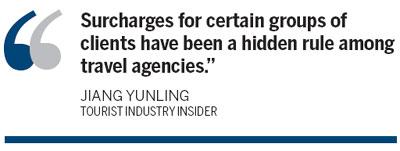 An elderly woman and her grandson checks ads of tourism agencies. ZOU HONG / CHINA DAILY
An elderly woman and her grandson checks ads of tourism agencies. ZOU HONG / CHINA DAILY
Newlywed Wang Jia never expected he and his wife would be "discriminated" against for their Beijing hukou, or permanent residence.
The couple plotted a perfect plan for their honeymoon during the past Spring Festival - they would go to Australia and New Zealand to enjoy the summer sunshine of the Southern Hemisphere.
When they decided to sign the contract with a branch of BTG International Travel and Tours, which provided the cheapest price for a typical 10-day trip, they were told to add a 2,750-yuan surcharge for each person.
"The reasons for the surcharge were absurd: We're a couple and we're Beijingers!" said Wang.
The travel agency told them clients from Beijing and Shanghai "tend to have weaker purchasing power," according to certain unexplained statistics, as do couples, children and the elderly.
BTG officials claimed with an appearance of innocence that they were just "following the regulation of local travel agencies in Australia and New Zealand", said Wang.
The couple relented and paid the dual surcharge for their "couple" and "Beijinger" identities because the trip was "super popular" and "only two Beijingers were allowed to be allocated to each 20-person tour team", he said.
Traveling with people from northeast China who were "too liberal with their money to be surcharged", said Wang, he and his wife were relieved they were not older than 60 years old or younger than 18 - age groups rocked with even stiffer penalties by the agency.
As it turned out, the couple's spending was on par with others in the group, making the surcharge seem all the more arbitrary.
"Surcharges for certain groups of clients have been a hidden rule among travel agencies," said Jiang Yunling, who once worked in the tourist industry. "We know such conduct is not compliant, but travel agencies have to guarantee their profit when some clients are not likely to buy enough goods," said a tour guide surnamed Hao.
Jiang said travel agencies usually win more customers from their competitors by offering an unreasonably cheaper starting price, which even cannot cover the cost of airfares and hotels.
"Their only way to gain a profit is the return on commissions from goods bought by customers at appointed stores," Jiang explained. So groups with purported "lack of consumption capability" would have to "contribute their own slices in advance," Jiang said.
Schoolteachers, journalists and lawyers are also treated with such price discrimination by some travel agencies, according to Jiang.
A 56-year-old customer surnamed Gao said she found the surcharge standards and definitions of "aged people" and "children" quite uneven. The guidelines vary wildly among different travel agencies, too.
Gao inquired with several travel agencies to choose a trip for herself and her 18-year-old daughter. She found that if she chose the 2,100-yuan 5-day trip to Hong Kong and Macao offered by China International Travel Service, Beijing, she would be surcharged 200 yuan because she is older than 55. Her daughter, who is under 22, would be surcharged 700 yuan if she slept in the same bed with her mother, otherwise 1,200 yuan for an extra bed.
"Children refers to people under 22 by the tourist industry," Gao said she was told by an agency representative.
But when the 56-year-old asked about a similar trip provided by Beijing Youth Travel Service Co Ltd., the answer was that older people wouldn't be surcharged, and children under 18 would be surcharged 350 yuan per day.
Surcharges varied with other destinations, such as the Australia-New Zealand route, Yunnan route, and some Southeast Asian routes.
China International Travel Service, Beijing, for example, would surcharge 2,000 yuan from people who are either above 60, under 18, a couple, or Beijingers, for their Australia-New Zealand route. But they don't surcharge for any Southeast Asian routes.
Beijing Youth Travel Service doesn't surcharge for the Australia-New Zealand trip but does tack on a fee for people under 18 on the Singapore-Malaysia-Thailand route, and people older than 60 for the Phuket, Thailand, and Bali, Indonesia itineraries.
Officials from either travel agencies, including BTG, were reluctant to provide details when asked about the surcharges. They would only give the accurate number when a customer decides to register for a specific route, said Gao.
"Such surcharges are actually price discrimination and forced consumption, which violate the Consumer Protection Law and the Pricing Law," said Qiu Baochang, head of the lawyers group of China Consumers' Association.






